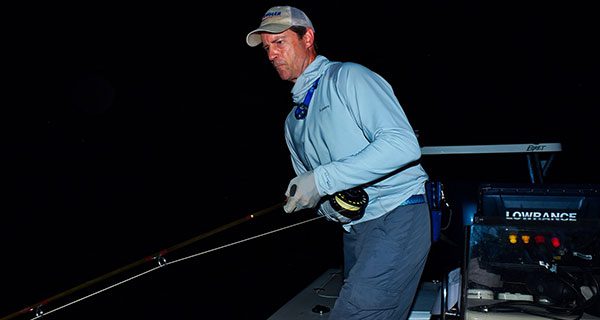Night fishing is a totally different world. The heart pounds a little faster out in the water when it’s dark. There is a hyper activity of your senses and a thrill of wondering what is on the end of your line as you reach into the black water. I really enjoy fly fishing at night. Anything from tarpon to snook and reds in salt, to bass and cats in freshwater. They are all more exciting in the dark.
The fly ‘casting’ part of the adventure is much different too. The weight of the line against the rod tip as you lift the line is more prominent. The bending or loading of the rod is felt in a completely different way when we can’t see things happening. You notice the tip of the rod bending, then the mid-section as the weight of the rod seems to increase, and then the weightlessness as the rod unbends and sends the line out into the night.
Then you have to wait and anticipate. Is the line extended? If I wait for the tug in the back, it may be too late to keep the tension or letting the line fall too far. The loop control is completely subjective. You can’t see the shape of the loop. How do you know when it’s a good one? Here is a good way to improve your casting day or night.
If you have a buddy and can go out casting, set up a 40 foot target. Make some casts as your friend watches the shape of the loops. Then close your eyes, pretend you are on a flats boat in shark-infested waters with rolling waves about to cast to a tarpon. Never mind, skip that part, just close your eyes and make several casts and feel the rod bending and unbending. Talk with your buddy as you do it, and tell him when you feel you have made good loops or bad loops. You will know. You will feel the rod loading and unloading, the timing coming together and the sound of the cast will be more of a whisper than a woosh-woosh (A term not found in the Fly Fishers International glossary, but should be).
Closing your eyes will get rid of the distractions and allow your body to feel what is going on. ‘Seeing’ what your cast is doing is super important too, but most of us only see about a third of our casts, the forward third. If you are going to open your eyes, open them and watch your backcast. It’s as important as your forward cast.
